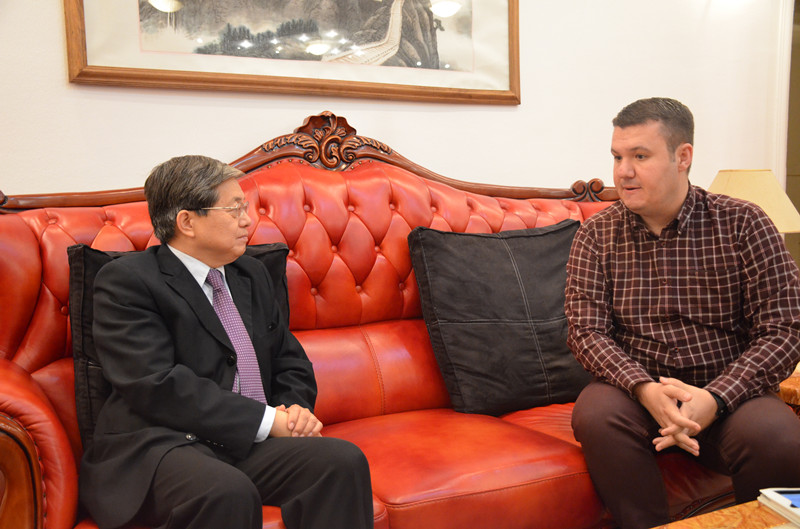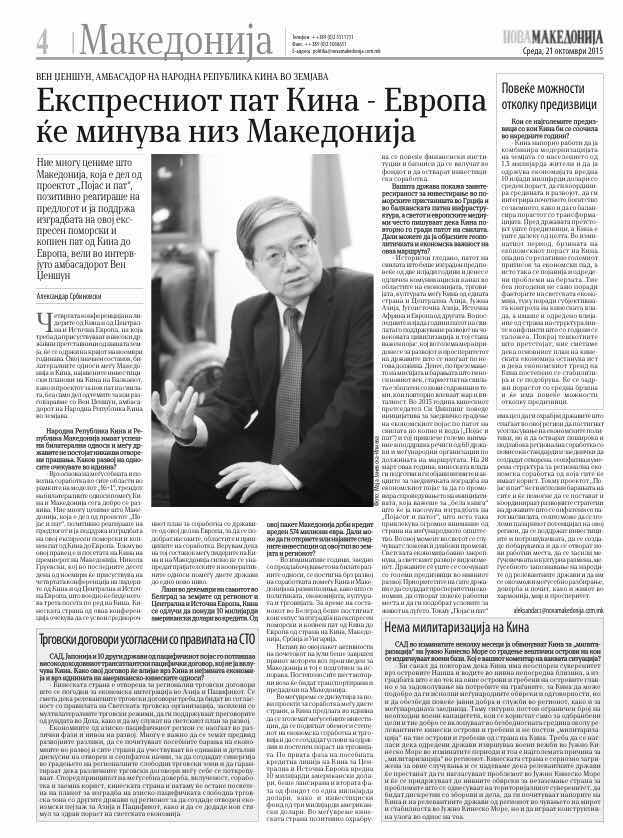| Nova Makedonija Interviewed Ambassador Wen Zhenshun |
| 2015-10-21 23:15 |
|
On 20th October, Ambassador Wen Zhenshun was interviewed by Mr. Aleksandar Srbinovski, journalist from Nova Makedonija. Ambassador Wen answered questions regarding the bilateral relations between China and Macedonia, the cooperation between China and 16 Central- and Eastern European Countries, the "Belt and Road" initiative, the latest development of China's economy as well as some hot issues. Nova Makedonija(New Macedonia) is the oldest daily newspaper in the Republic of Macedonia, the amount of circulation ranks the 3rd among all the daily newspapers in the country and mostly aims at the interllectual readers.
On 21st October, Nova Makedonija published the full interview in Macedonian, the English translation of the interview is as follows: Q: Peoples Republic of China and the Republic of Macedonia have successful bilateral relations and there are no outstanding issues. How do you see the relations developing in the future? A: Based on the mutual and beneficial cooperation within all areas under the framework of "16+1",CEEC-China, the trend of the bilateral relations between China and Macedonia develops well at present. We highly appreciate that Macedonia, as one country along the "Belt and Road", positively responding to the proposal and supporting the construction of the "China-Europe Land-Sea Express Passage". Prime Minister Gruevski will visit China in the end of November this year, attending the 4th Leaders' conference of China-CEEC, which will also be his 3rd visiting of China in a row. The Chinese side is looking forward to having the Mid-term Cooperation Plan of China-CEEC adopted, in order to fix the direction, area and principle of the cooperation. I have faith that meeting between state leaders of China and Macedonia will strongly promote the friendly and cooperative relation between both countries up to a new stage. Q: Summit of the Heads of government of China and Central and Eastern European countries was held last year in december in Belgrade after China decided to place 10 billion US dolars to the region of Balkans. Macedonia already got a credit worth 574 million euros. Can you reveal Beijing investment interests in Macedonia and the region? A: In recent years, along with deepening bilateral relations, rapid development of cooperation were reached between China and Macedonia on various fields like, politics, economy, culture as well as trade. Promoted by the mechanism of "16+1"cooperation, breakthrough was achieved in the infrustracture field between both countries. Among the first CEE coutries used Chinese prefretial credit, the two high way projects contracted by Sinohydro are comprehensively implemented in Macedonia. During Belgrade meeting by the end of last year, consensus were reached for constructing the "China-Europe Land-Sea Express Passage"by China, Macedonia, Serbia and Hungary.By the beginning of July this year, the first motor train unit manufactured for Macedonia completed and rolled of the production line. Step by step, all 6 units of motor train will be transported and handed over to Macedonia. Meanwhile, new cooperation projects between both sides are also under discussion. China proposes to increase mutual investment, elevate the scale and level of economic cooperation and trade, and create conditions for the sustained and steady growth of trade. We encourage Chinese and CEEC businesses to discuss the possibilities and opportunities of using the convenient geographic locations and favorable investment environment of China and CEECs to jointly explore third markets. We also encourage Chinese and CEEC financial institutions to continue to engage in cooperation in flexible and diverse forms, explore creative models of financial cooperation, and improve financing conditions for businesses. Followed by the stage one of the US$10 billion special credit line for CEECs, China has launched stage two of the Fund with US$1 billion and Investment Fund of US$3 billion. The Chinese side positively encourages more financial institutions and businesses to contribute to the Fund and conduct investment cooperation. Q: Your country showed interests in investments in the sea-ports in Greece and in the Balkans road infrastructure. World and euoropean media often write that China is rebuilding the Silk road. Can you explain the geopolitical and economic importance of this route? A: With the review of human history, the Silk Road on land which started more than two thousand years ago and the Maritime Silk Road built afterwards together provided a great communication channel in economic & trade and culture field between China and the Central Asia, South Asia, Southeast Asia, Eastern Africa and Europe. In the past thousand years, the Silk Road promoted the progress of human civilization, and became an important belt to contribute greatly to the prosperity and development of the countries along the Silk Road. Today, undertaking the mission and call of the new century, the ancient Silk Road is endowed with the new content and topics, which once again instills vigor and vitality. In 2013, Chinese State President Xi Jinping raised the initiative of jointly building the Silk Road Economic Belt and the 21st-Century Maritime Silk Road (hereinafter referred to as the Belt and Road), which have attracted close attention and support from nearly 60 countries and international organizations along the route. On 28th March 2015, the Chinese government drafted and published the Vision and Actions on Jointly Building Silk Road Economic Belt and 21st-Century Maritime Silk Road to promote the implementation of the Initiative, which is considered as a guideline paper for the construction of the Belt and Road and attracts lots of attention from the international community. Complex and profound changes are taking place in the world. The world economy is recovering slowly, and global development is diversified. Countries still face big challenges in their development. To make a prosperous economy, to create more jobs and to improve people's living conditions have been the priorities for all the countries. The Belt and Road aims at encouraging the countries along the route to achieve economic policy coordination and carry out broader and deeper regional cooperation of higher standards, and jointly creating an open, inclusive and balanced regional economic cooperation architecture that benefits all. The Belt and Road will meet the requirements and help align and coordinate the development strategies of the countries along the Belt and Road, tap market potential in this region, promote investment and consumption, create demands and job opportunities, enhance people-to-people and cultural exchanges, and mutual learning among the peoples of the relevant countries, and enable them to understand, trust and respect each other and live in harmony, peace and prosperity. Q: Macedonia and China in the last couple of years had two significant military meetings of high officials. The first one was on the end of 2013 when the China's minister of defence at that time General Liang Guanglie visited the Macedonia and the second one was on 12-th of december 2014 when Sasho Stefanoski, State Secretary of Macedonian Defense Ministry, meet the chinese Defense Minister Chang Wanquan, pledging to strengthen cooperation between two countries and two armies. Are there any new developments in this field? A: In recent years, military exchange and cooperation between China and Macedonia develop well. Besides the two important visits you mentioned, in August, 2014, Deputy Chief of General Staff of PLA, Lieutenant General Wang Guanzhong visited Macedonia and had successful and fruitful talks with Defense Minister Jolevski, then-Chief of General Staff Lieutenant General Koteski and then-Deputy Chief of General Staff Lieutenant General Sejdini. What worth mentioning is that great cooperation are also kept in the field of human-resource training between both armies. The Chinese side stays positive towards the military exchange and cooperation between China and Macedonia and would like to maintain the mutual visit of high-level officials between both armies and exchange of all fields. Q: United States, Japan and 10 other Pacific Rim nations reached a final agreement on the largest regional trade accord in history, and one that does not include China. How will this agreement afect China and its economy and the future of U.S.-China relations ? A:The Chinese side is open to regional trade arrangements that are conducive to economic integration in the Asia-Pacific. It is believed that relevant trade arrangements should fall in line with WTO rules, reinforce multilateral trade regimes, promote the Doha round of negotiations and serve the global development agenda. The Asia-Pacific economies are at different stages and levels of development. It is imperative that development disparities should be taken into account, special requests from developing economies be respected and all parties take part in equal-footed and thorough discussions in an open and inclusive manner so as to forge a synergy in building regional free trade areas and ensure that different free trade arrangements reinforce each other. Following the principle of mutual trust, inclusiveness, cooperation and mutual benefit, the Chinese side stays committed to pressing ahead with the building of the Asia-Pacific free trade area with others from the region so as to create an open economic landscape for the Asia-Pacific and inject new impetus to the sound growth of global economy. Q: The United States of America in the last couple of months are accusing China of „militarizing" the South China Sea by building artificial islands. What are youre comments on this situation? A: I would like to reiterate that China has indisputable sovereignty over the Nansha Islands and their affliliated islets. Construction carried out by the Chinese side on relevant islands and reefs of the Nansha Islands is mainly to satisfy civilian needs, better fulfill China's international responsibility and obligation, and provide more public goods and services to the region and the international community. There certainly are a limited amount of necessary military facilities for defense purposes only. They fit well with the security environment around relevant Chinese islands and islets. There is no such thing of China "militarizing" relevant islands and islets. It should be pointed out that certain countries have been flexing military muscles in the South China Sea over recent period of times. That is the biggest cause of "militarization" in the South China Sea. The Chinese side is severely concerned about that. We hope that the relevant countries could stop playing up the issue of South China Sea, make good on their commitment of not taking sides on issues concerning territorial sovereignty, be discreet with words and deeds, respect efforts by China and relevant regional countries in safeguarding peace and stability in the South China Sea, and play a constructive role to that end. Q: What are the biggest chalenges for China in the upcoming years? A: Within the 30 years of Reform and Opening, based on our basic condition, China has developed a road with Chinese characteristics. The millennium development goals have been basically realized in China by reducing 439 million populations below the poverty line, and splendid achievement in the areas of education, health and social security. Today, China is working hard to combine the modernization with the 1.3 billion populations and to keep the USD 10-trillion economy with medium-high speed increase, to coordinate environment and development, to integrate the early wealth with mutual wealth, to balance the increase with transformation. A lot of challenges are still in front and China still has a long way to go. In the recent period, the speed of economic increase in China declined with comparatively large pressure for economic descend, and also some turmoil of the stock market revealed. These were affected because of not only the factors of the global economy, but also the subjective control of the Chinese government, as well as some influence from the structural contradictions accumulated in years. Despite the difficulties ahead, we believe that fundamental plane of Chinese economy hasn't changed, and the economic trend in China is gradually stabilized and grows better. Medium-high speed increase will be maintained and there are more opportunities than challenges.
|
 |
|

